Legal Duties of Directors and Officers in Business Ethics
VerifiedAdded on 2023/06/10
|5
|1406
|327
AI Summary
This article discusses the legal duties of directors and officers in business ethics, including their duty to monitor and supervise the conduct of the business, employ an equitable decision-making process, and act in the best interest of the company. It also explores the benefits of compliance, such as a united organizational strategy, transparency, trust, and brand loyalty, and the consequences of noncompliance, including lawsuits, penalties, and personal liability. The article concludes with policies for directors and officers to avoid violating legal duties and maintain compliance.
Contribute Materials
Your contribution can guide someone’s learning journey. Share your
documents today.
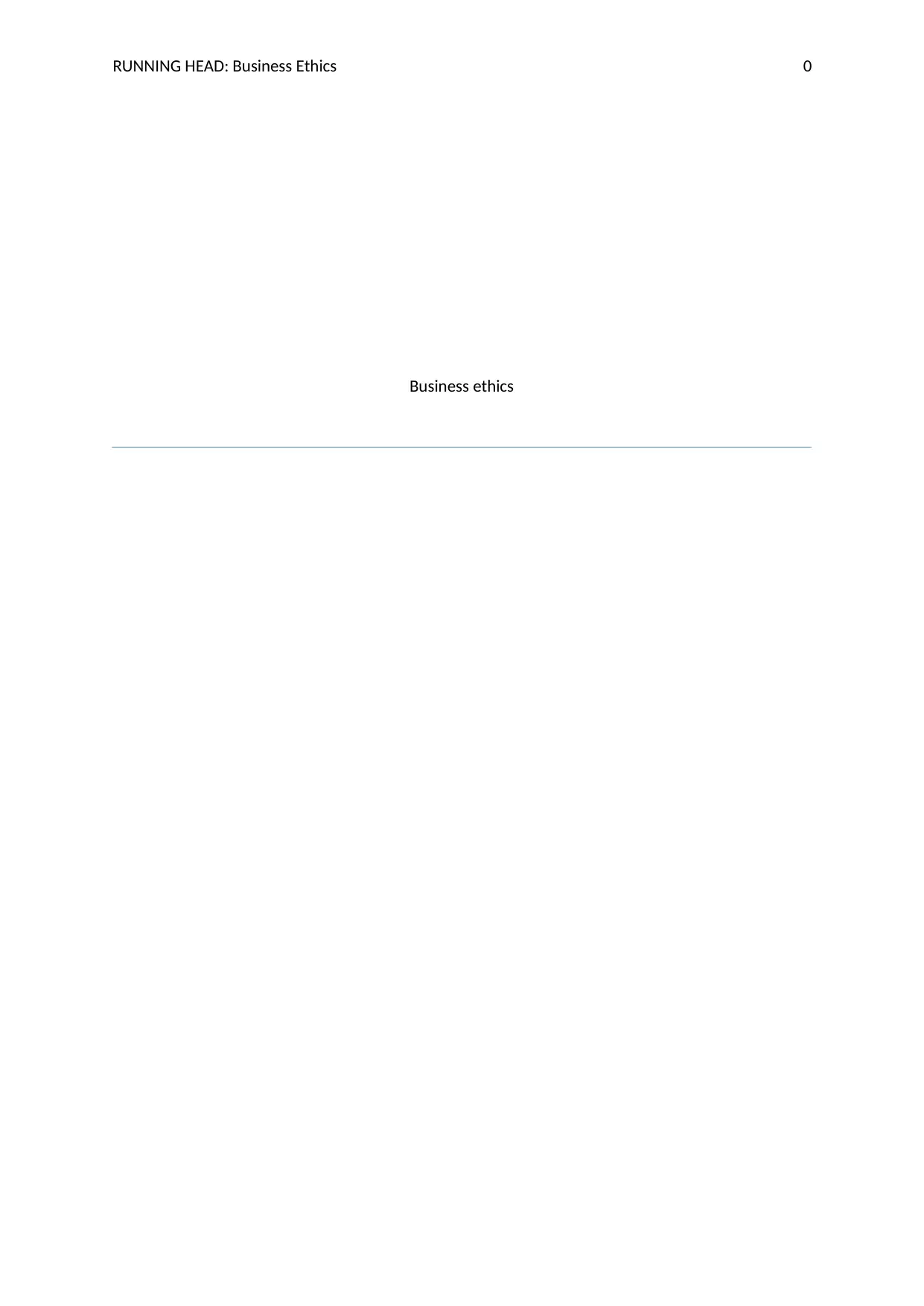
RUNNING HEAD: Business Ethics 0
Business ethics
Business ethics
Secure Best Marks with AI Grader
Need help grading? Try our AI Grader for instant feedback on your assignments.
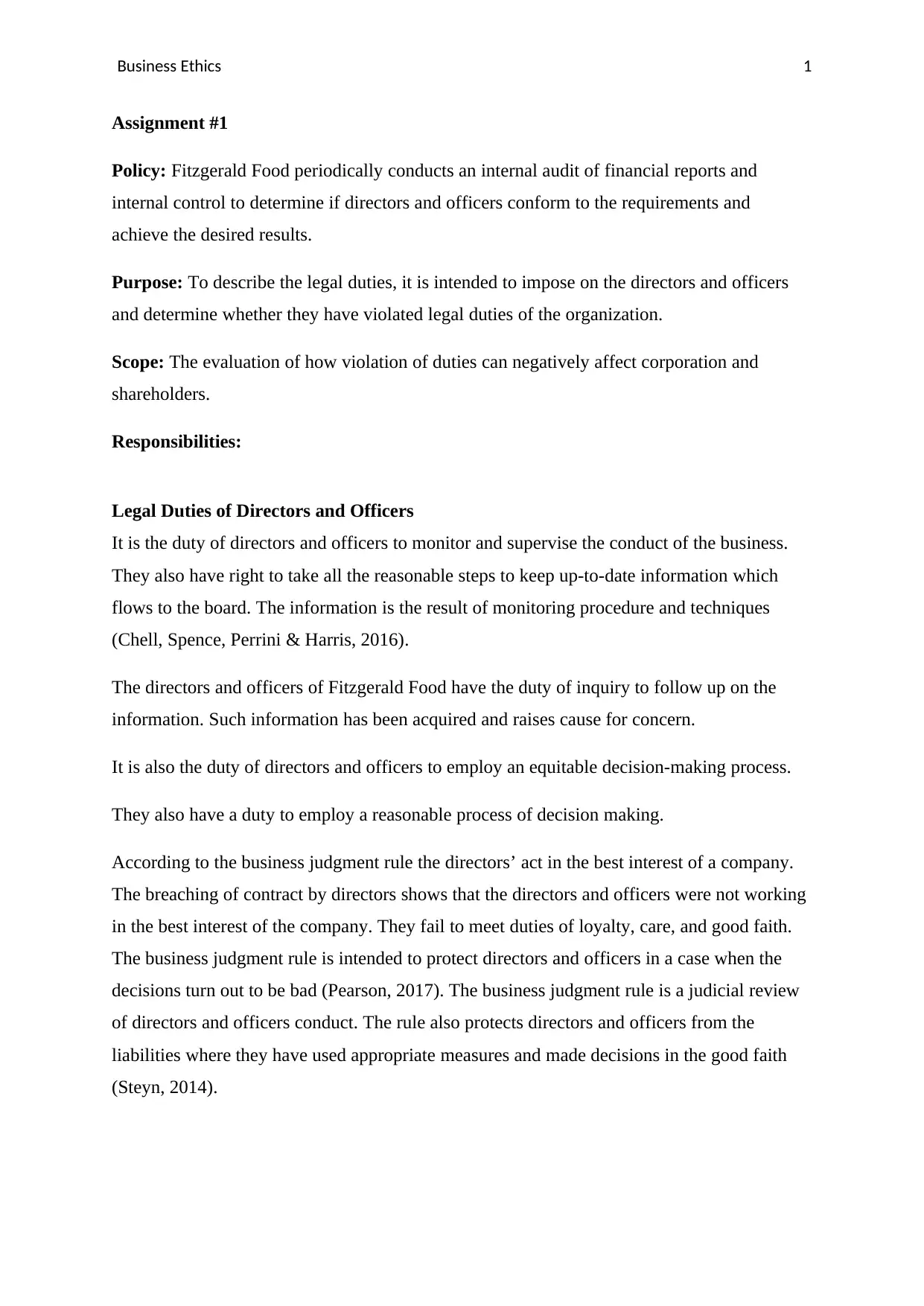
Business Ethics 1
Assignment #1
Policy: Fitzgerald Food periodically conducts an internal audit of financial reports and
internal control to determine if directors and officers conform to the requirements and
achieve the desired results.
Purpose: To describe the legal duties, it is intended to impose on the directors and officers
and determine whether they have violated legal duties of the organization.
Scope: The evaluation of how violation of duties can negatively affect corporation and
shareholders.
Responsibilities:
Legal Duties of Directors and Officers
It is the duty of directors and officers to monitor and supervise the conduct of the business.
They also have right to take all the reasonable steps to keep up-to-date information which
flows to the board. The information is the result of monitoring procedure and techniques
(Chell, Spence, Perrini & Harris, 2016).
The directors and officers of Fitzgerald Food have the duty of inquiry to follow up on the
information. Such information has been acquired and raises cause for concern.
It is also the duty of directors and officers to employ an equitable decision-making process.
They also have a duty to employ a reasonable process of decision making.
According to the business judgment rule the directors’ act in the best interest of a company.
The breaching of contract by directors shows that the directors and officers were not working
in the best interest of the company. They fail to meet duties of loyalty, care, and good faith.
The business judgment rule is intended to protect directors and officers in a case when the
decisions turn out to be bad (Pearson, 2017). The business judgment rule is a judicial review
of directors and officers conduct. The rule also protects directors and officers from the
liabilities where they have used appropriate measures and made decisions in the good faith
(Steyn, 2014).
Assignment #1
Policy: Fitzgerald Food periodically conducts an internal audit of financial reports and
internal control to determine if directors and officers conform to the requirements and
achieve the desired results.
Purpose: To describe the legal duties, it is intended to impose on the directors and officers
and determine whether they have violated legal duties of the organization.
Scope: The evaluation of how violation of duties can negatively affect corporation and
shareholders.
Responsibilities:
Legal Duties of Directors and Officers
It is the duty of directors and officers to monitor and supervise the conduct of the business.
They also have right to take all the reasonable steps to keep up-to-date information which
flows to the board. The information is the result of monitoring procedure and techniques
(Chell, Spence, Perrini & Harris, 2016).
The directors and officers of Fitzgerald Food have the duty of inquiry to follow up on the
information. Such information has been acquired and raises cause for concern.
It is also the duty of directors and officers to employ an equitable decision-making process.
They also have a duty to employ a reasonable process of decision making.
According to the business judgment rule the directors’ act in the best interest of a company.
The breaching of contract by directors shows that the directors and officers were not working
in the best interest of the company. They fail to meet duties of loyalty, care, and good faith.
The business judgment rule is intended to protect directors and officers in a case when the
decisions turn out to be bad (Pearson, 2017). The business judgment rule is a judicial review
of directors and officers conduct. The rule also protects directors and officers from the
liabilities where they have used appropriate measures and made decisions in the good faith
(Steyn, 2014).
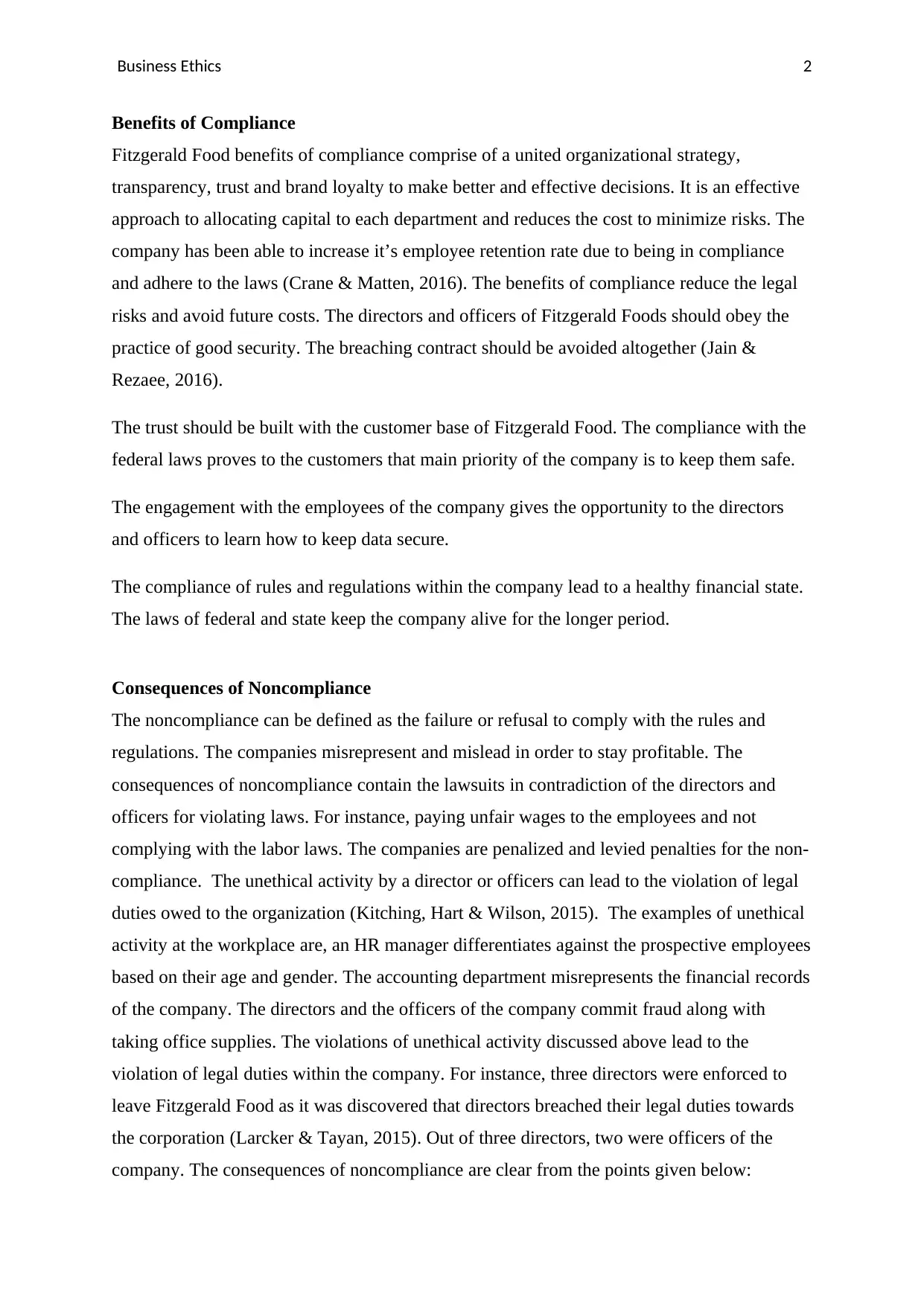
Business Ethics 2
Benefits of Compliance
Fitzgerald Food benefits of compliance comprise of a united organizational strategy,
transparency, trust and brand loyalty to make better and effective decisions. It is an effective
approach to allocating capital to each department and reduces the cost to minimize risks. The
company has been able to increase it’s employee retention rate due to being in compliance
and adhere to the laws (Crane & Matten, 2016). The benefits of compliance reduce the legal
risks and avoid future costs. The directors and officers of Fitzgerald Foods should obey the
practice of good security. The breaching contract should be avoided altogether (Jain &
Rezaee, 2016).
The trust should be built with the customer base of Fitzgerald Food. The compliance with the
federal laws proves to the customers that main priority of the company is to keep them safe.
The engagement with the employees of the company gives the opportunity to the directors
and officers to learn how to keep data secure.
The compliance of rules and regulations within the company lead to a healthy financial state.
The laws of federal and state keep the company alive for the longer period.
Consequences of Noncompliance
The noncompliance can be defined as the failure or refusal to comply with the rules and
regulations. The companies misrepresent and mislead in order to stay profitable. The
consequences of noncompliance contain the lawsuits in contradiction of the directors and
officers for violating laws. For instance, paying unfair wages to the employees and not
complying with the labor laws. The companies are penalized and levied penalties for the non-
compliance. The unethical activity by a director or officers can lead to the violation of legal
duties owed to the organization (Kitching, Hart & Wilson, 2015). The examples of unethical
activity at the workplace are, an HR manager differentiates against the prospective employees
based on their age and gender. The accounting department misrepresents the financial records
of the company. The directors and the officers of the company commit fraud along with
taking office supplies. The violations of unethical activity discussed above lead to the
violation of legal duties within the company. For instance, three directors were enforced to
leave Fitzgerald Food as it was discovered that directors breached their legal duties towards
the corporation (Larcker & Tayan, 2015). Out of three directors, two were officers of the
company. The consequences of noncompliance are clear from the points given below:
Benefits of Compliance
Fitzgerald Food benefits of compliance comprise of a united organizational strategy,
transparency, trust and brand loyalty to make better and effective decisions. It is an effective
approach to allocating capital to each department and reduces the cost to minimize risks. The
company has been able to increase it’s employee retention rate due to being in compliance
and adhere to the laws (Crane & Matten, 2016). The benefits of compliance reduce the legal
risks and avoid future costs. The directors and officers of Fitzgerald Foods should obey the
practice of good security. The breaching contract should be avoided altogether (Jain &
Rezaee, 2016).
The trust should be built with the customer base of Fitzgerald Food. The compliance with the
federal laws proves to the customers that main priority of the company is to keep them safe.
The engagement with the employees of the company gives the opportunity to the directors
and officers to learn how to keep data secure.
The compliance of rules and regulations within the company lead to a healthy financial state.
The laws of federal and state keep the company alive for the longer period.
Consequences of Noncompliance
The noncompliance can be defined as the failure or refusal to comply with the rules and
regulations. The companies misrepresent and mislead in order to stay profitable. The
consequences of noncompliance contain the lawsuits in contradiction of the directors and
officers for violating laws. For instance, paying unfair wages to the employees and not
complying with the labor laws. The companies are penalized and levied penalties for the non-
compliance. The unethical activity by a director or officers can lead to the violation of legal
duties owed to the organization (Kitching, Hart & Wilson, 2015). The examples of unethical
activity at the workplace are, an HR manager differentiates against the prospective employees
based on their age and gender. The accounting department misrepresents the financial records
of the company. The directors and the officers of the company commit fraud along with
taking office supplies. The violations of unethical activity discussed above lead to the
violation of legal duties within the company. For instance, three directors were enforced to
leave Fitzgerald Food as it was discovered that directors breached their legal duties towards
the corporation (Larcker & Tayan, 2015). Out of three directors, two were officers of the
company. The consequences of noncompliance are clear from the points given below:
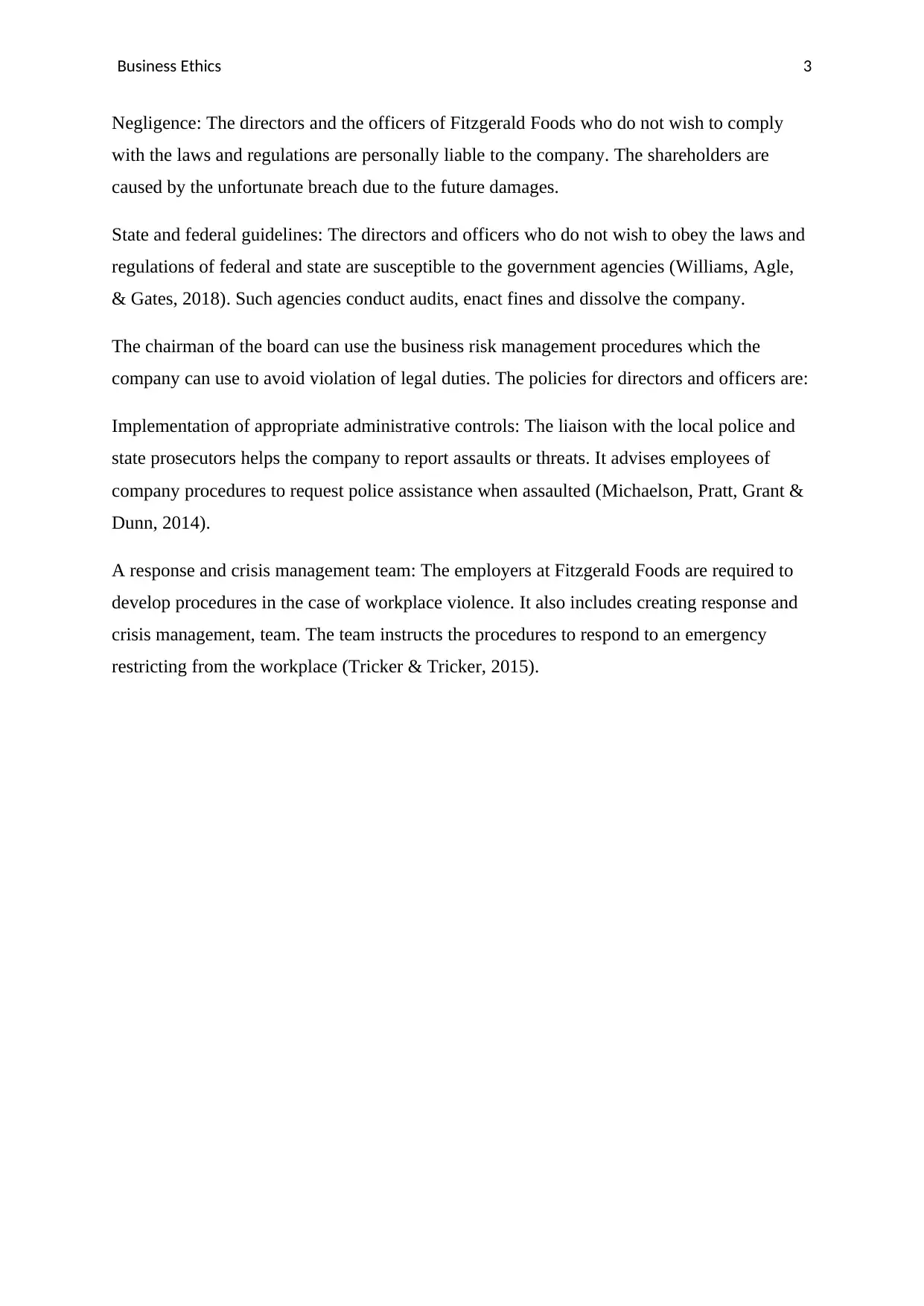
Business Ethics 3
Negligence: The directors and the officers of Fitzgerald Foods who do not wish to comply
with the laws and regulations are personally liable to the company. The shareholders are
caused by the unfortunate breach due to the future damages.
State and federal guidelines: The directors and officers who do not wish to obey the laws and
regulations of federal and state are susceptible to the government agencies (Williams, Agle,
& Gates, 2018). Such agencies conduct audits, enact fines and dissolve the company.
The chairman of the board can use the business risk management procedures which the
company can use to avoid violation of legal duties. The policies for directors and officers are:
Implementation of appropriate administrative controls: The liaison with the local police and
state prosecutors helps the company to report assaults or threats. It advises employees of
company procedures to request police assistance when assaulted (Michaelson, Pratt, Grant &
Dunn, 2014).
A response and crisis management team: The employers at Fitzgerald Foods are required to
develop procedures in the case of workplace violence. It also includes creating response and
crisis management, team. The team instructs the procedures to respond to an emergency
restricting from the workplace (Tricker & Tricker, 2015).
Negligence: The directors and the officers of Fitzgerald Foods who do not wish to comply
with the laws and regulations are personally liable to the company. The shareholders are
caused by the unfortunate breach due to the future damages.
State and federal guidelines: The directors and officers who do not wish to obey the laws and
regulations of federal and state are susceptible to the government agencies (Williams, Agle,
& Gates, 2018). Such agencies conduct audits, enact fines and dissolve the company.
The chairman of the board can use the business risk management procedures which the
company can use to avoid violation of legal duties. The policies for directors and officers are:
Implementation of appropriate administrative controls: The liaison with the local police and
state prosecutors helps the company to report assaults or threats. It advises employees of
company procedures to request police assistance when assaulted (Michaelson, Pratt, Grant &
Dunn, 2014).
A response and crisis management team: The employers at Fitzgerald Foods are required to
develop procedures in the case of workplace violence. It also includes creating response and
crisis management, team. The team instructs the procedures to respond to an emergency
restricting from the workplace (Tricker & Tricker, 2015).
Secure Best Marks with AI Grader
Need help grading? Try our AI Grader for instant feedback on your assignments.
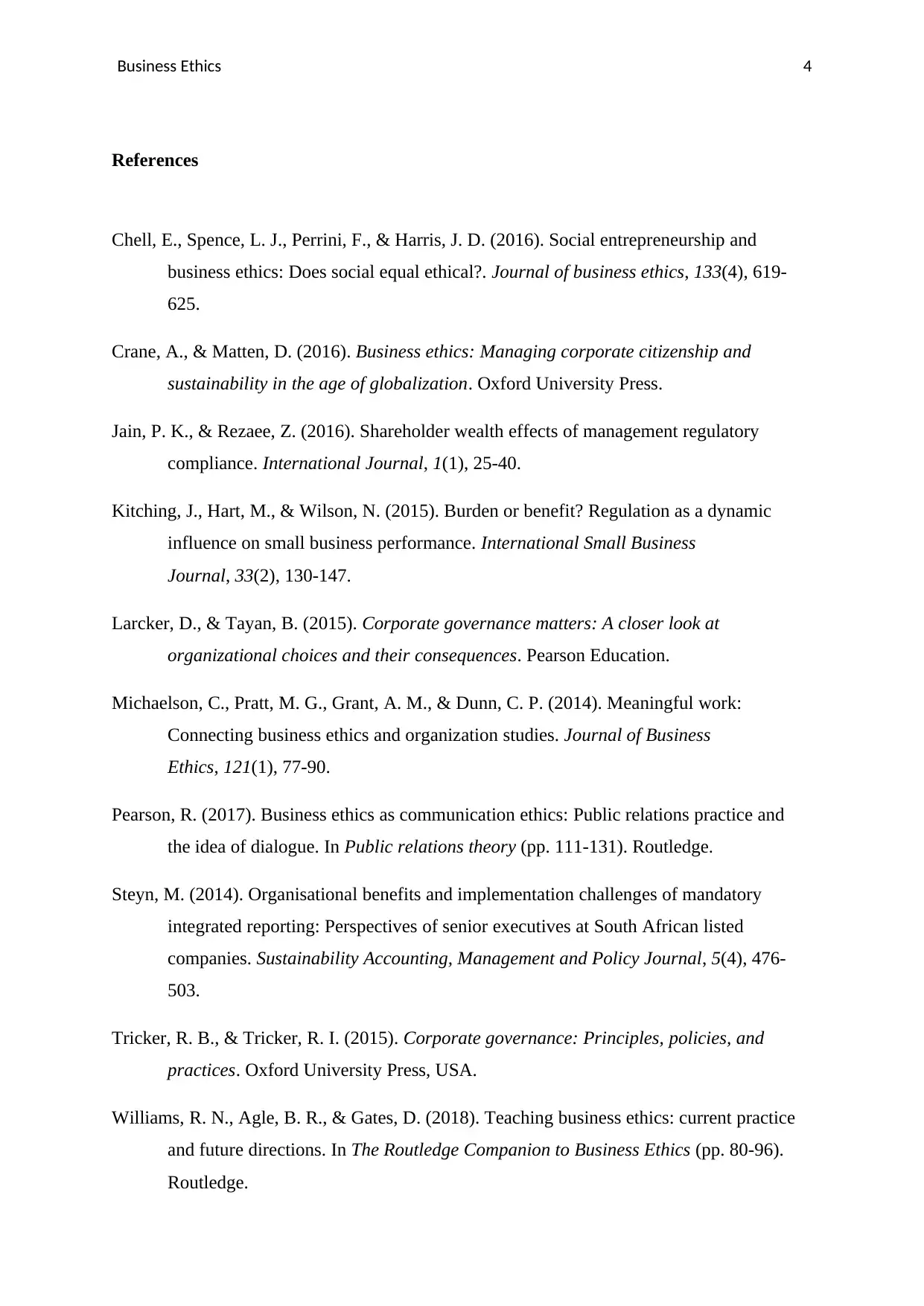
Business Ethics 4
References
Chell, E., Spence, L. J., Perrini, F., & Harris, J. D. (2016). Social entrepreneurship and
business ethics: Does social equal ethical?. Journal of business ethics, 133(4), 619-
625.
Crane, A., & Matten, D. (2016). Business ethics: Managing corporate citizenship and
sustainability in the age of globalization. Oxford University Press.
Jain, P. K., & Rezaee, Z. (2016). Shareholder wealth effects of management regulatory
compliance. International Journal, 1(1), 25-40.
Kitching, J., Hart, M., & Wilson, N. (2015). Burden or benefit? Regulation as a dynamic
influence on small business performance. International Small Business
Journal, 33(2), 130-147.
Larcker, D., & Tayan, B. (2015). Corporate governance matters: A closer look at
organizational choices and their consequences. Pearson Education.
Michaelson, C., Pratt, M. G., Grant, A. M., & Dunn, C. P. (2014). Meaningful work:
Connecting business ethics and organization studies. Journal of Business
Ethics, 121(1), 77-90.
Pearson, R. (2017). Business ethics as communication ethics: Public relations practice and
the idea of dialogue. In Public relations theory (pp. 111-131). Routledge.
Steyn, M. (2014). Organisational benefits and implementation challenges of mandatory
integrated reporting: Perspectives of senior executives at South African listed
companies. Sustainability Accounting, Management and Policy Journal, 5(4), 476-
503.
Tricker, R. B., & Tricker, R. I. (2015). Corporate governance: Principles, policies, and
practices. Oxford University Press, USA.
Williams, R. N., Agle, B. R., & Gates, D. (2018). Teaching business ethics: current practice
and future directions. In The Routledge Companion to Business Ethics (pp. 80-96).
Routledge.
References
Chell, E., Spence, L. J., Perrini, F., & Harris, J. D. (2016). Social entrepreneurship and
business ethics: Does social equal ethical?. Journal of business ethics, 133(4), 619-
625.
Crane, A., & Matten, D. (2016). Business ethics: Managing corporate citizenship and
sustainability in the age of globalization. Oxford University Press.
Jain, P. K., & Rezaee, Z. (2016). Shareholder wealth effects of management regulatory
compliance. International Journal, 1(1), 25-40.
Kitching, J., Hart, M., & Wilson, N. (2015). Burden or benefit? Regulation as a dynamic
influence on small business performance. International Small Business
Journal, 33(2), 130-147.
Larcker, D., & Tayan, B. (2015). Corporate governance matters: A closer look at
organizational choices and their consequences. Pearson Education.
Michaelson, C., Pratt, M. G., Grant, A. M., & Dunn, C. P. (2014). Meaningful work:
Connecting business ethics and organization studies. Journal of Business
Ethics, 121(1), 77-90.
Pearson, R. (2017). Business ethics as communication ethics: Public relations practice and
the idea of dialogue. In Public relations theory (pp. 111-131). Routledge.
Steyn, M. (2014). Organisational benefits and implementation challenges of mandatory
integrated reporting: Perspectives of senior executives at South African listed
companies. Sustainability Accounting, Management and Policy Journal, 5(4), 476-
503.
Tricker, R. B., & Tricker, R. I. (2015). Corporate governance: Principles, policies, and
practices. Oxford University Press, USA.
Williams, R. N., Agle, B. R., & Gates, D. (2018). Teaching business ethics: current practice
and future directions. In The Routledge Companion to Business Ethics (pp. 80-96).
Routledge.
1 out of 5
Related Documents
Your All-in-One AI-Powered Toolkit for Academic Success.
+13062052269
info@desklib.com
Available 24*7 on WhatsApp / Email
![[object Object]](/_next/static/media/star-bottom.7253800d.svg)
Unlock your academic potential
© 2024 | Zucol Services PVT LTD | All rights reserved.





